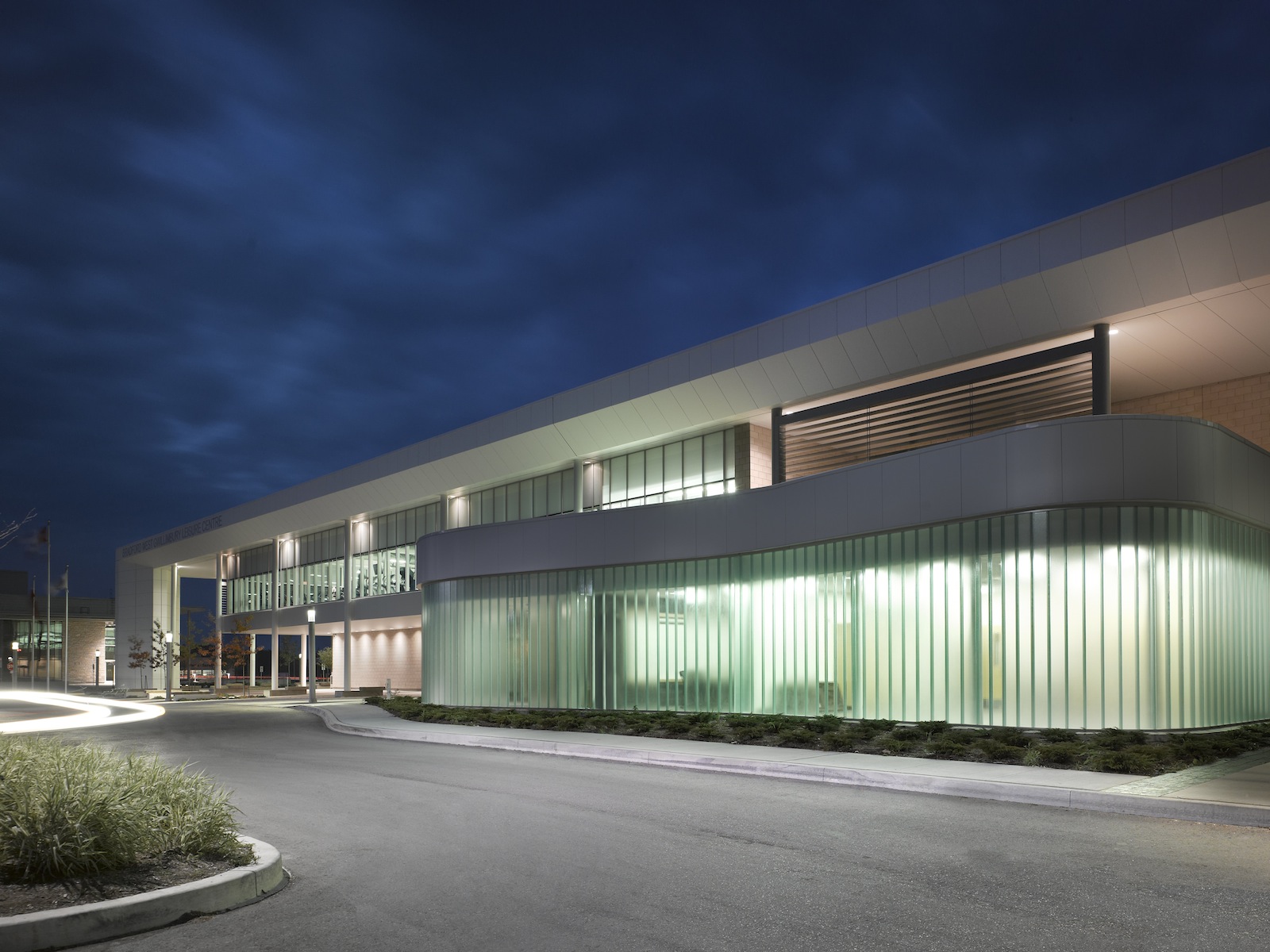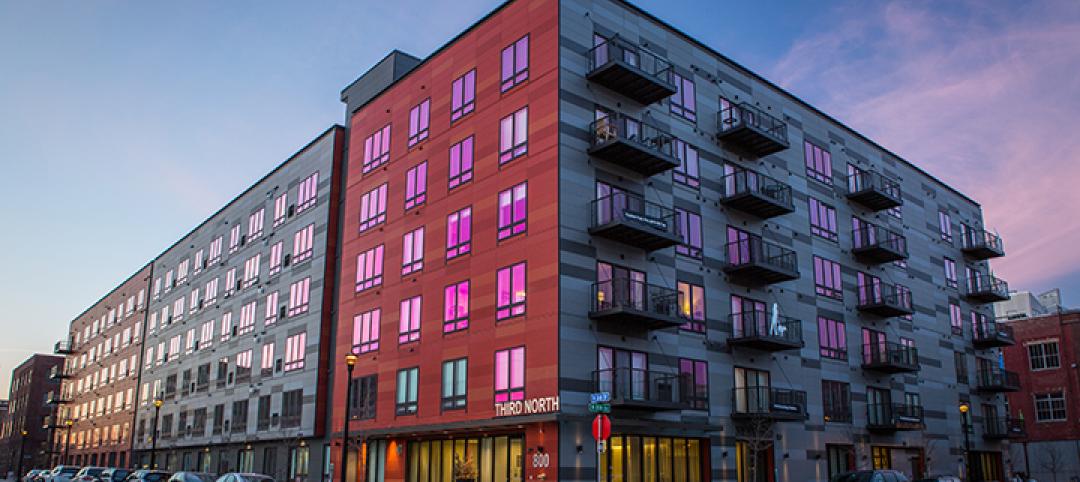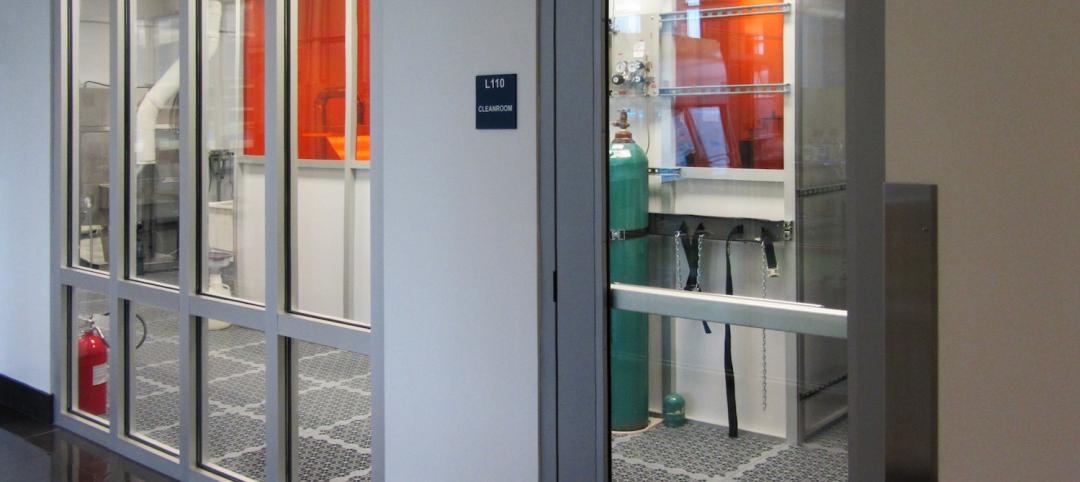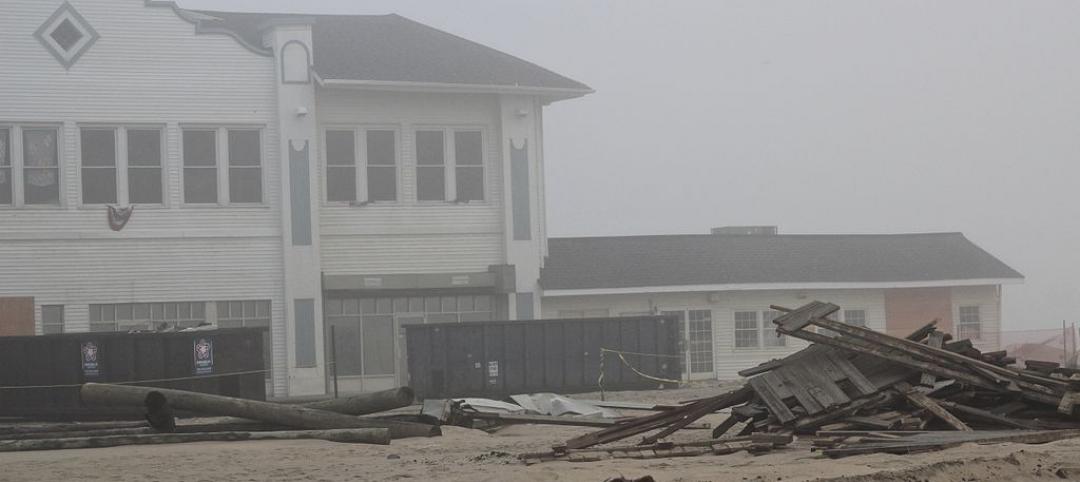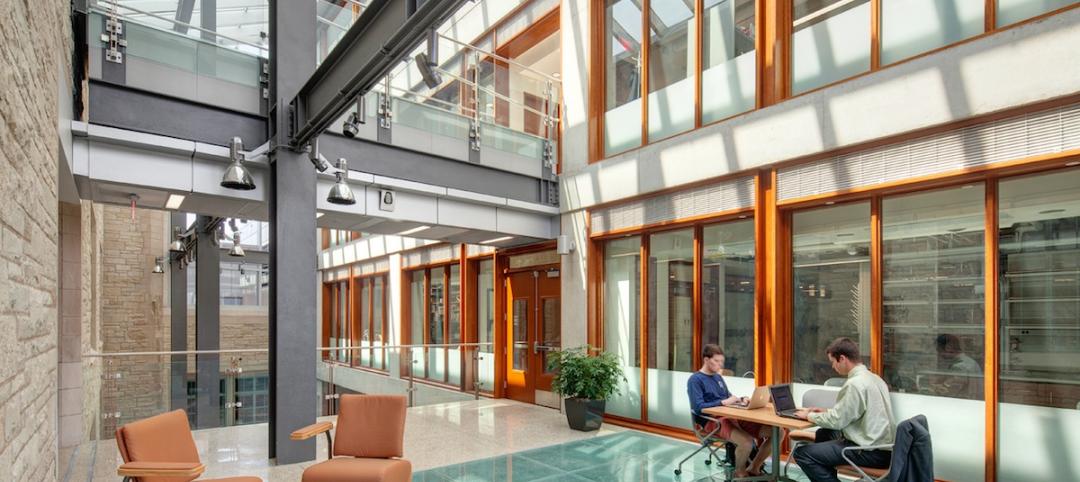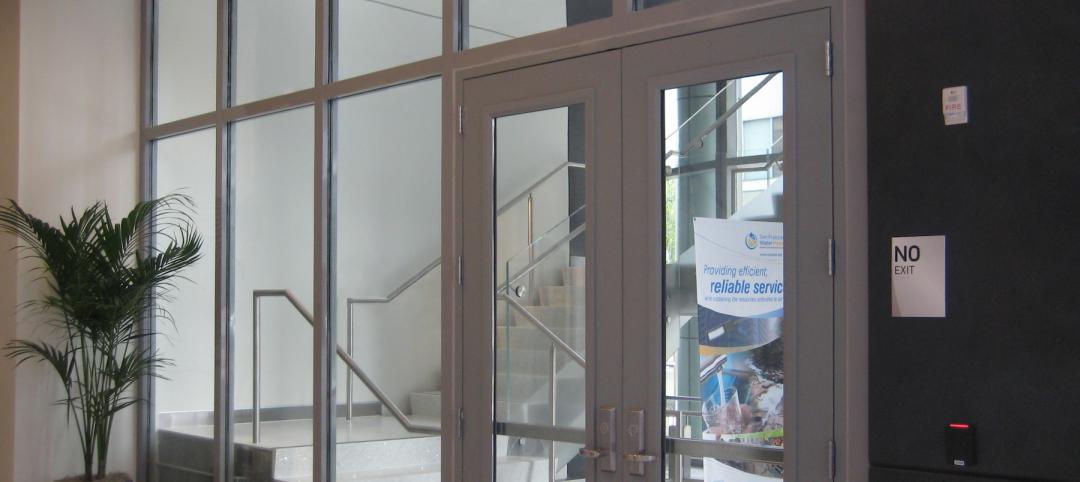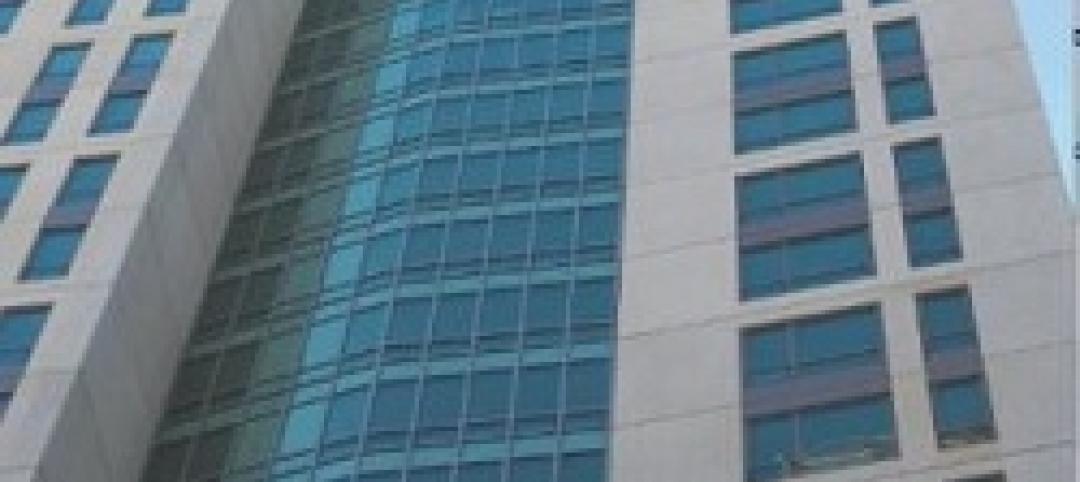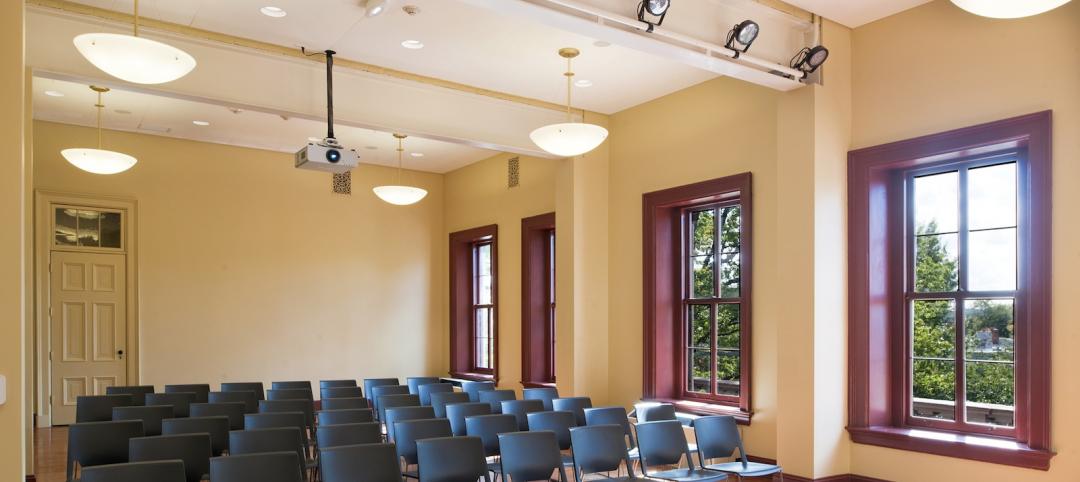Project: Bradford West Gwillimbury Leisure Centre
Location: Ontario, Canada
Architect: Salter Pilon Architecture in association with Lett Architects
Glazing Contractor: Aeroloc Industries
Channel Glass Supplier: Technical Glass Products
Glass Style: Pilkington Profilit™ channel glass; low-e tempered Pilkington Profilit channel glass
Ontario's new Bradford West Gwillimbury Leisure Centre, designed by Salter Pilon Architecture, is one of the largest multi-use recreation facilities in the province. However, it does more than foster a healthy lifestyle through recreational and cultural activities. Its 1,400-sf serpentine channel glass wall delivers dramatic visual appeal for residents—one of the town's three core visions for the new facility.
To create the curving glass façade, the design team turned to Pilkington Profilit™ channel glass. Unlike conventional windows and glass block, its slender frames and narrow channel glass segments allow for tight radii—as low as 1.9 meters (78 in.). While this flexibility enabled the design team to create a serpentine configuration, one technical challenge was ensuring a homogenous appearance in areas of the facade with different radii. Channel glass segments tangent to one another flow smoothly into adjacent curves or straight sections. Creating a seamless transition is more complex where different radii prevent tangent segments.
To ensure the U-shaped channel glass system did not interfere with the joint connection and interrupt the channel glass wall’s uniform look, flanged L-shaped channel glass planks were installed on one side of the joint transition and full U-shaped channel glass planks on the opposing side. This configuration allowed the channel glass framing head and sill components to be stretch-formed into a smooth continuous structure with a precise radius.
The serpentine channel glass application is formed of a mixture of standard cast glass and clear channel glass. The standard cast glass diffuses light through its textured surface while also obscuring vision. Clear cast glass adds a second layer of visual interest and provides occupants with greater access to daylight and views to nature. This glazing combination helps the system meet the different light transfer, privacy and visibility needs of the various rooms it encloses. A low-emissivity coating further boosts the façade’s thermal performance.
The completed façade flanks the Bradford West Gwillimbury Leisure Centre’s east exterior wall. It breaks up the building’s rectangular shape and serves as a surround for a lobby, meeting room and multipurpose room. By day it transmits light into the leisure centre’s interior rooms. By night, its backlit form helps welcome people inside.
TGP’s Pilkington Profilit channel glass soars up to 23 feet, can be installed vertically or horizontally, and formed into straight or curved walls. It is available in a variety of textures and colors with varying degrees of translucency, allowing light through while maintaining privacy. Pilkington Profilit can be used in interior or exterior applications, with insulating Lumira® aerogel for superior energy efficiency.
For more information on Pilkington Profilit channel glass, along with TGP’s other specialty architectural glazing materials, visit www.tgpamerica.com.
Technical Glass Products
800.426.0279
800.451.9857 – fax
sales@fireglass.com
www.fireglass.com
Related Stories
Sponsored | | Jun 4, 2014
Fiber cement panels bridge historic and modern at Minneapolis apartment complex
The design team for the Third North apartment complex specified Nichiha’s Illumination Series architectural panels in a blend of six colors—divided into swaths of reds and swaths of grays—that combine with a rectilinear shape to complement nearby brick.
| May 27, 2014
Fire Rated Glass contributes to open lab environment at JSNN
Openness and transparency were high priorities in the design of the Joint School of Nanoscience & Nanoengineering within the Gateway University Research Park in Greensboro, N.C. Because the facility’s nanobioelectronics clean room houses potentially explosive materials, it needed to be able to contain flames, heat, and smoke in the event of a fire. SPONSORED CONTENT
| May 27, 2014
Contractors survey reveals improving construction market
The construction industry is on the road to recovery, according to a new survey by Metal Construction News. Most metrics improved from the previous year’s survey, including a 19.4% increase in the average annual gross contracting sales volume. SPONSORED CONTENT
| May 20, 2014
Kinetic Architecture: New book explores innovations in active façades
The book, co-authored by Arup's Russell Fortmeyer, illustrates the various ways architects, consultants, and engineers approach energy and comfort by manipulating air, water, and light through the layers of passive and active building envelope systems.
| May 20, 2014
Using fire-rated glass in exterior applications
Fire-rated glazing and framing assemblies are just as beneficial on building exteriors as they are on the inside. But knowing how to select the correct fire-rated glass for exterior applications can be confusing. SPONSORED CONTENT
| May 13, 2014
19 industry groups team to promote resilient planning and building materials
The industry associations, with more than 700,000 members generating almost $1 trillion in GDP, have issued a joint statement on resilience, pushing design and building solutions for disaster mitigation.
Sponsored | | May 3, 2014
Fire-rated glass floor system captures light in science and engineering infill
In implementing Northwestern University’s Engineering Life Sciences infill design, Flad Architects faced the challenge of ensuring adequate, balanced light given the adjacent, existing building wings. To allow for light penetration from the fifth floor to the ground floor, the design team desired a large, central atrium. One potential setback with drawing light through the atrium was meeting fire and life safety codes.
| Apr 25, 2014
Recent NFPA 80 updates clarify fire rated applications
Code confusion has led to misapplications of fire rated glass and framing, which can have dangerous and/or expensive results. Two recent NFPA 80 revisions help clarify the confusion. SPONSORED CONTENT
| Apr 8, 2014
Fire resistive curtain wall helps The Kensington meet property line requirements
The majority of fire rated glazing applications occur inside a building to allow occupants to exit the building safely or provide an area of refuge during a fire. But what happens when the threat of fire comes from the outside? This was the case for The Kensington, a mixed-use residential building in Boston.
| Apr 2, 2014
8 tips for avoiding thermal bridges in window applications
Aligning thermal breaks and applying air barriers are among the top design and installation tricks recommended by building enclosure experts.


